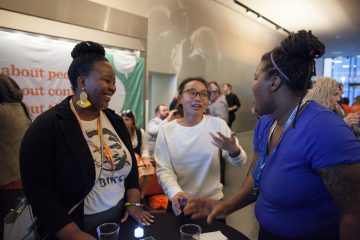Story
Inclusive Events That Spark True Engagement
A toolkit for inclusive events
DATE
June 29, 2020

Published by Bush staff
When you plan an event, you may dream of excited participants, lively conversations and people who feel welcomed and engaged. But that doesn’t just happen on its own. One of our core values at the Bush Foundation is that everybody matters. Over the past few years, we’ve focused on learning from our event attendees and using their feedback to develop inclusive events that spark true engagement and allow attendees to participate fully.
ASK YOURSELF: When have I felt most welcomed and comfortable at an event? Why?
We start with the concept of universal design: picture the people who are least familiar with your event, your topic or the other attendees — then design for them. Our goal is that everyone feels cared for, and no one is put in the uncomfortable position of having to ask for extra support. That might mean being intentional about how you greet participants from the beginning, or explaining industry terms and acronyms and explicitly honoring all the identities present. We strive to use the Platinum Rule: Treat others as they want to be treated.
One way to do this is to ensure you know your audience. Building relationships is key to understanding what people need. You can also capture input via registration forms and event surveys. If you ask, listen and act, people are usually happy to share and contribute ideas to make your event better for everyone.
,
ASK OTHERS: How could we make this event more welcoming and inclusive?
Through listening to event attendees, we have learned valuable lessons that we’ve turned into a toolkit of tips for creating inclusive events. Some are simple and some are more complex, but all have helped us make Bush Foundation events more accessible, welcoming and engaging for everyone. And, we’ll keep learning with each event we do.
Tips for Planning Inclusive Events
Planning
Team: Build in ways to get meaningful input during your planning process from people with diverse backgrounds and perspectives.
Accessibility: What can you offer to meet attendees’ needs? Consider supports such as American Sign Language (ASL), captioning (live and on videos), assistive listening devices, non-English translation or interpretation, large-print materials and signage, mobility devices or other things your attendees might need. Consider people’s financial ability to attend your event, and what you can do, such as assisting people without access to a credit card if they need one to stay overnight at a hotel.
Scheduling: Avoid academic, religious and cultural observances/holidays. (See Google’s Calendars of Interest.) Consider implications such as fasting days, prayer times and other needed breaks for participants.
Space: Ensure your space will feel welcoming to all (avoid religious spaces, bars, etc.) Consider how accessible the venue is, whether it’s close to public transit lines, and how you can offer private spaces for nursing, prayer, medical needs, quiet space, etc. Walk through the space with wheelchairs or other accessibility needs in mind.
Logistics
Registration: Ask about accessibility issues, dietary restrictions and private space needs, then address them. Make sure to use the information you collect.
Food and beverage: Try to meet as many dietary needs as possible in each meal, and label everything. Be thoughtful about whether you offer alcohol, and always offer non-alcoholic options.
Setup: Make things easy for people, whether that means large, clear signage or printed instructions that spell things out.
Authentic connections: Find creative ways to foster connections, and consider ways you can disrupt power dynamics. Consider adding question prompts to nametags instead of job titles, or mix up seating arrangements.
Staff: Equip your staff and volunteers to assist attendees as needed. Have extra volunteers or staff on hand, in case someone needs extra support. Discuss your values with any security personnel.
Communications and Programming
Information: Spell out, up front, the kind of support you will offer attendees, so they don’t have to ask.
Communications: Set the tone for your event throughout all of your communications, from your invitation to your website to confirmation messages. Select your language and images carefully. Use clear, friendly language.
Gender inclusivity: Share pronouns during introductions and offer a gender-neutral restroom. Consider sharing a statement about why these things are important.
Native land acknowledgment: Do your research and include an acknowledgement that educates people and honors Native people of the past, present and future. Learn more from the Native Governance Center
Program: Include a diverse set of presenters as experts, as well as facilitators and hosts. Offer various activities that reach people with different learning styles and cultural norms, and offer opportunities for people to participate and feel connected and valued. Close out with clear follow-up expectations and tangible action steps.
Reflection and Growth
Check in: How is your event going? Assign staff and volunteers to keep an ear out for any issues or questions that arise throughout the event and share them with organizers so you can address them in real time. Keep tabs on social media, as well.
Listen: Survey attendees after the event and use the results to create an even better event next time.
Debrief: Take time to discuss wins and opportunities with staff, partners, and/or attendees.
Keep learning: Identify areas you’d like to understand better, find people who can help, build those relationships and ask for input.
Special thanks to Events by Lady K for their thought partnership on inclusive events.
Continue reading
-

Story
Initiating changemakers
How the Initiators Fellowship supports business enterprises that prioritize social and environmental good throughout Greater Minnesota.
-

Note from Jen
Note from Jen: Acknowledging and learning from the boarding school era
The Bush Foundation was invited to the gathering at Gila River...
-

News
Meet the 2024 Bush Prize winners!
Bush Prize winners are doing big things in partnership with their communities.